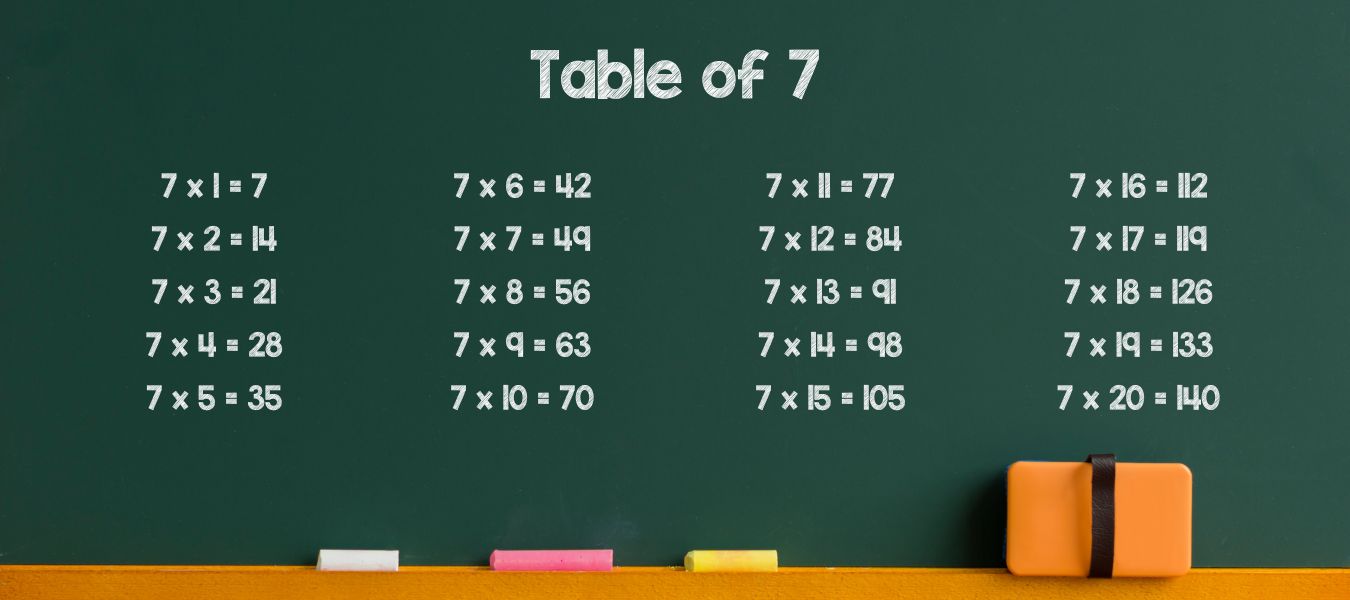Multiplication Table of 7

Multiplication is a key part of maths that we use every day. It helps us understand numbers and solve problems. One of the first steps in learning multiplication is getting to know the multiplication tables. In this article, we focus on the multiplication table of 7. Knowing this table well can make maths much easier and more fun.
Multiplication is just adding a number to itself a certain number of times. For example, when we multiply 7 by 4 (written as 7x4), it's the same as adding 7 four times (7+7+7+7). This equals 28. The multiplication table of 7 is a list of results we get when we multiply 7 by other numbers.
Learning the table of 7 is important because it's one of the basic building blocks of maths. Once you know it well, other parts of maths, like division and more complex multiplication, become much easier. It's like learning the alphabet before you start making words and sentences.
For an introduction to tables, read our guide to tables from 1 to 20.
What are Multiplication Tables?
Multiplication tables are lists of numbers. They show you the results when you multiply numbers together. Think of them as a shortcut for doing lots of multiplication problems.
A multiplication table is like a big chart. It helps you find the answers to multiplication problems quickly. The most common one is the table that goes up to 10 (though the table below goes up to 100). For example, the multiplication table of 7 looks like this:
- 7 times 1 is 7
- 7 times 2 is 14
- 7 times 3 is 21
- ... and so on, up to 7 times 10 is 70.
Multiplication tables are very useful. They help you solve maths problems faster. When you know them well, you can do harder maths more easily. This is why many people try to remember all the tables up to 10 or even higher. It's like having a maths tool in your brain, ready to use whenever you need it.
Table of 7
When multiplying any two numbers, the number being multiplied (i.e. 7 in this case) is called the multiplicand, whereas the number of times it is to be multiplied is the multiplier. The answer to multiplying these two numbers is known as the product. For example, if we are evaluating 7 times 3, 7 is the multiplicand, 3 is the multiplier, and the product is 21.
Below is the table of 7, with multipliers up to 100.
| 7 | x | 1 | = | 7 |
| 7 | x | 2 | = | 14 |
| 7 | x | 3 | = | 21 |
| 7 | x | 4 | = | 28 |
| 7 | x | 5 | = | 35 |
| 7 | x | 6 | = | 42 |
| 7 | x | 7 | = | 49 |
| 7 | x | 8 | = | 56 |
| 7 | x | 9 | = | 63 |
| 7 | x | 10 | = | 70 |
| 7 | x | 11 | = | 77 |
| 7 | x | 12 | = | 84 |
| 7 | x | 13 | = | 91 |
| 7 | x | 14 | = | 98 |
| 7 | x | 15 | = | 105 |
| 7 | x | 16 | = | 112 |
| 7 | x | 17 | = | 119 |
| 7 | x | 18 | = | 126 |
| 7 | x | 19 | = | 133 |
| 7 | x | 20 | = | 140 |
| 7 | x | 21 | = | 147 |
| 7 | x | 22 | = | 154 |
| 7 | x | 23 | = | 161 |
| 7 | x | 24 | = | 168 |
| 7 | x | 25 | = | 175 |
| 7 | x | 26 | = | 182 |
| 7 | x | 27 | = | 189 |
| 7 | x | 28 | = | 196 |
| 7 | x | 29 | = | 203 |
| 7 | x | 30 | = | 210 |
| 7 | x | 31 | = | 217 |
| 7 | x | 32 | = | 224 |
| 7 | x | 33 | = | 231 |
| 7 | x | 34 | = | 238 |
| 7 | x | 35 | = | 245 |
| 7 | x | 36 | = | 252 |
| 7 | x | 37 | = | 259 |
| 7 | x | 38 | = | 266 |
| 7 | x | 39 | = | 273 |
| 7 | x | 40 | = | 280 |
| 7 | x | 41 | = | 287 |
| 7 | x | 42 | = | 294 |
| 7 | x | 43 | = | 301 |
| 7 | x | 44 | = | 308 |
| 7 | x | 45 | = | 315 |
| 7 | x | 46 | = | 322 |
| 7 | x | 47 | = | 329 |
| 7 | x | 48 | = | 336 |
| 7 | x | 49 | = | 343 |
| 7 | x | 50 | = | 350 |
| 7 | x | 51 | = | 357 |
| 7 | x | 52 | = | 364 |
| 7 | x | 53 | = | 371 |
| 7 | x | 54 | = | 378 |
| 7 | x | 55 | = | 385 |
| 7 | x | 56 | = | 392 |
| 7 | x | 57 | = | 399 |
| 7 | x | 58 | = | 406 |
| 7 | x | 59 | = | 413 |
| 7 | x | 60 | = | 420 |
| 7 | x | 61 | = | 427 |
| 7 | x | 62 | = | 434 |
| 7 | x | 63 | = | 441 |
| 7 | x | 64 | = | 448 |
| 7 | x | 65 | = | 455 |
| 7 | x | 66 | = | 462 |
| 7 | x | 67 | = | 469 |
| 7 | x | 68 | = | 476 |
| 7 | x | 69 | = | 483 |
| 7 | x | 70 | = | 490 |
| 7 | x | 71 | = | 497 |
| 7 | x | 72 | = | 504 |
| 7 | x | 73 | = | 511 |
| 7 | x | 74 | = | 518 |
| 7 | x | 75 | = | 525 |
| 7 | x | 76 | = | 532 |
| 7 | x | 77 | = | 539 |
| 7 | x | 78 | = | 546 |
| 7 | x | 79 | = | 553 |
| 7 | x | 80 | = | 560 |
| 7 | x | 81 | = | 567 |
| 7 | x | 82 | = | 574 |
| 7 | x | 83 | = | 581 |
| 7 | x | 84 | = | 588 |
| 7 | x | 85 | = | 595 |
| 7 | x | 86 | = | 602 |
| 7 | x | 87 | = | 609 |
| 7 | x | 88 | = | 616 |
| 7 | x | 89 | = | 623 |
| 7 | x | 90 | = | 630 |
| 7 | x | 91 | = | 637 |
| 7 | x | 92 | = | 644 |
| 7 | x | 93 | = | 651 |
| 7 | x | 94 | = | 658 |
| 7 | x | 95 | = | 665 |
| 7 | x | 96 | = | 672 |
| 7 | x | 97 | = | 679 |
| 7 | x | 98 | = | 686 |
| 7 | x | 99 | = | 693 |
| 7 | x | 100 | = | 700 |
Table of 7 Quiz Questions
Here are some questions to test your knowledge of the table of 7:
- What is 7 times 2?
- What is 7 times 5?
- What is 7 times 21?
- What is 7 times 25?
- What is 7 times 31?
- What is 7 times 54?
- What is 7 times 55?
- What is 7 times 73?
- What is 7 times 83?
- What is 7 times 91?
Attempt the above questions, and check your answers below:
- 14
- 35
- 147
- 175
- 217
- 378
- 385
- 511
- 581
- 637
Table of 7 Word Problems
Here are some word problems which will test your multiplication skills for the table of 7:
- A classroom has 7 rows of tables. Each row has 3 tables. How many tables are there, excluding the teacher’s table?
- In a garden, there are 7 rows of plants, and each row has 8 plants. How many plants are there in the garden?
- A private music concert is organised with 7 rows of seats. If each row has 10 seats, how many seats are there in total?
- In a book club, there are 7 members. Each member is supposed to read 5 books in a month. How many books are read by all members in a month?
- If you walk 1 kilometre in 7 minutes, how many kilometres can you walk in 35 minutes?
Take your time to answer these questions without using a calculator. Once you're done, check your answers below.
- 21 tables
- 56 plants
- 70 seats
- 35 books
- 5 kilometres
More Multiplication Tables
Table of 2Table of 3
Table of 4
Table of 5
Table of 6
Table of 8
Table of 9
Table of 10
Table of 11
Table of 12
Table of 13
Table of 14
Table of 15
Table of 16
Table of 17
Table of 18
Table of 19
Table of 20
